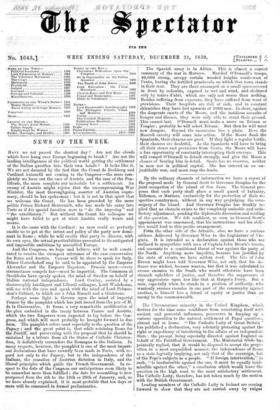NEWS OF THE WEEK.
HAVE we not passed the shortest day ? Are not the clouds which have hung over. Europe beginning to break ? Are not the leading intelligences of the political world getting the settlement of the Italian question into their own hands ? It looks like it.
We are not daunted by the fact that the Count de Rechberg and Cardinal Antonelli are coming to the Congress—the more com- pletely we have out the case of Austria and the case of the Pon- tificate, the more complete our materials for a settlement. An enemy of Austria might rejoice that the uncompromising War Minister, the most thoroughgoing asserter of Austrian supre- macy, should be her spokesman ; but it is not in that spirit that we welcome the Count. He has been preceded by the more politic Prince Richard Metternich, who has made his entry into Paris as if his special function were to ‘‘ do the imposing" and " the conciliatory." But without the Count his colleague we might have failed to get at what Austria really wants and means.
It is the same with the Cardinal : no man could so perfectly enable us to get at the intent and policy of the party now domi- nant in Rome ; while he will enable that party to discern, with its own eyes, the actual practicabilities presented to its antiquated and inipossible ambitions by assembled Europe.
And the Congress, we hope and believe, will bo well consti- tuted to receive the strongest utterance of the case conservative for Rome and Austria. Cavour will be there to speak for Italy. 'Prince Gortschakoff may be said to be appointed by the Emperor Alexander and the Emperor Napoleon. Prussia must—every circumstance compels her—must be impartial. The Commons at Stockholm have openly spoken the mind of Sweden on behalf of Italian national independence. Lord Cowley, assisted by a thororoughly intelligent and Liberal colleague, Lord Wodehouge, will see with the eyes and speak with the mind of Lord Palmer- ston's Cabinet, in which are a John Russell and a Gladstone.
Perhaps some light is thrown upon the mind of imperial France by the pamphlet which has just issued from the pen of N. de la Gnerroniere. It forms a very remarkable modification of the plan embodied in the treaty between France and Austria, which the two Emperors were expected to lay before the Con- gress, and which will most probably be brought forward in due form. The pamphlet refers most especially to the question of the Papacy ; and the great point is, that while retaining Rome for the Pontiff, and persevering with the proposal that he should be sustained by a tribute from all the States of Catholic Christen- dom, it definitively surrenders the Romagna to the Italians. In many respects, however, the pamphlet is one of the most import- ant declarations that have recently been made in Paris, with re- gard not only to the Papacy, but to the independence of the Italians, the cessation of Austrian dictation in Italy, and the liberal principles which guide the French Government. In re- spect to the date of the Congress our anticipations seem likely to be somewhat more than fulfilled ; the date for assembling is now postponed from the 5th to the 19th or 20th of January, and, as we have already explained, it is most probable that ten days or more will be consumed in formal preliminaries.






























